Unit 6 Ancient Stories 单元复习精讲精练课件
文档属性
| 名称 | Unit 6 Ancient Stories 单元复习精讲精练课件 |
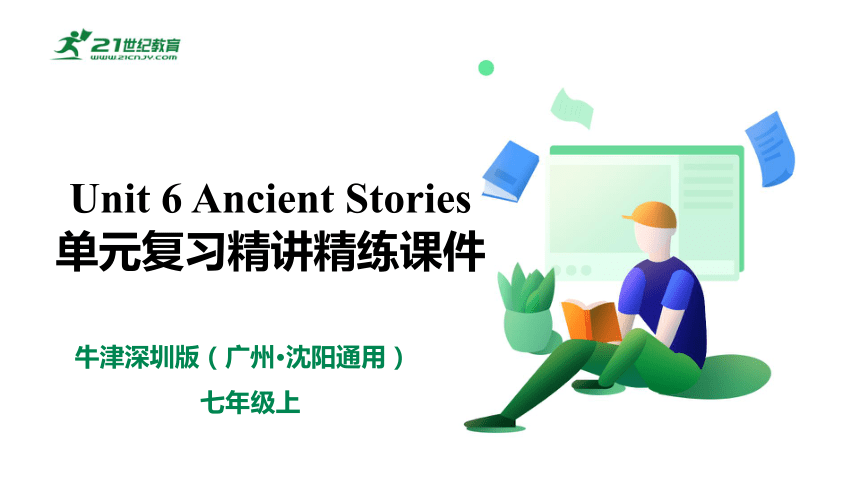
|
|
| 格式 | pptx | ||
| 文件大小 | 7.4MB | ||
| 资源类型 | 试卷 | ||
| 版本资源 | 牛津深圳版 | ||
| 科目 | 英语 | ||
| 更新时间 | 2023-11-28 15:44:57 | ||
图片预览

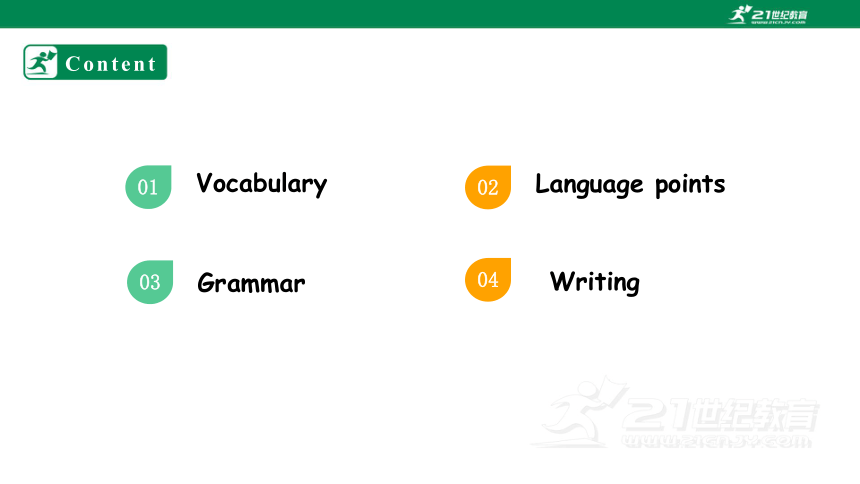

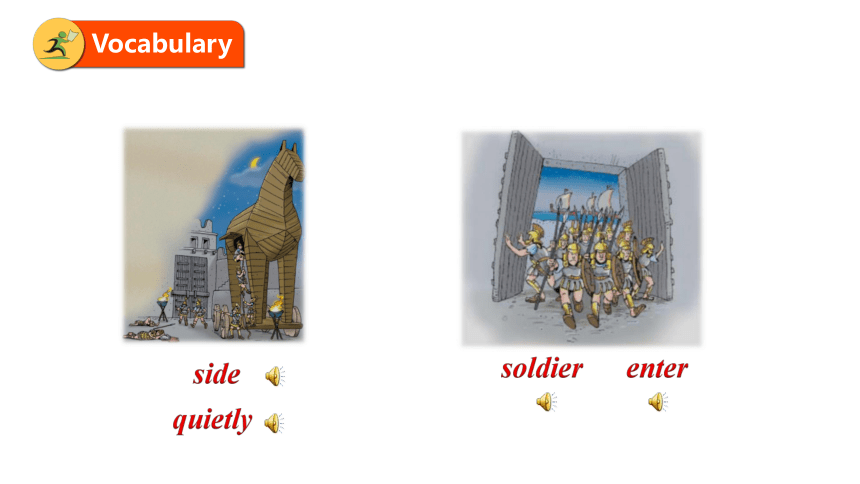
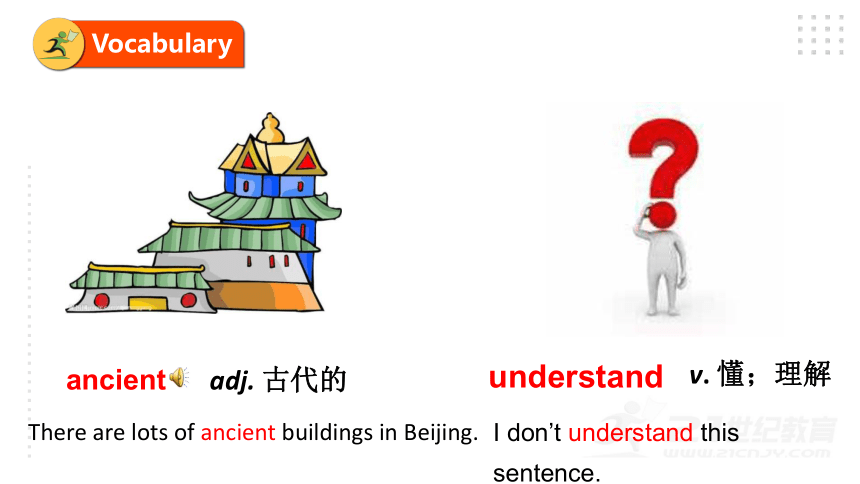
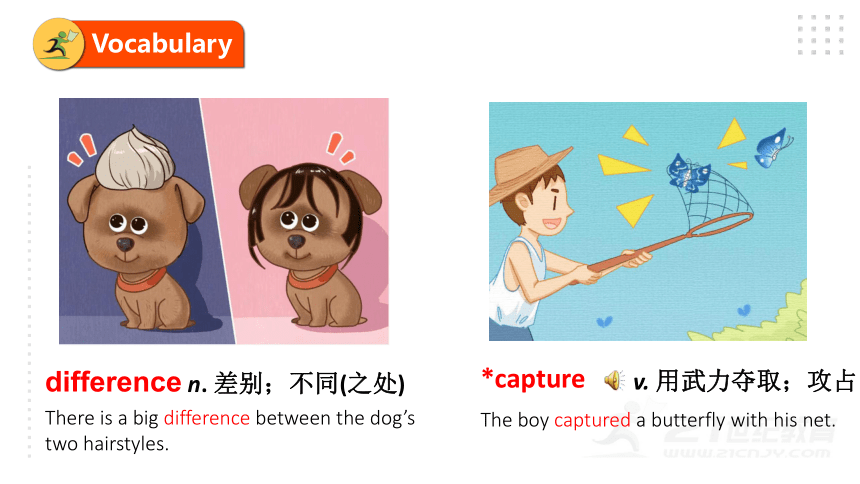


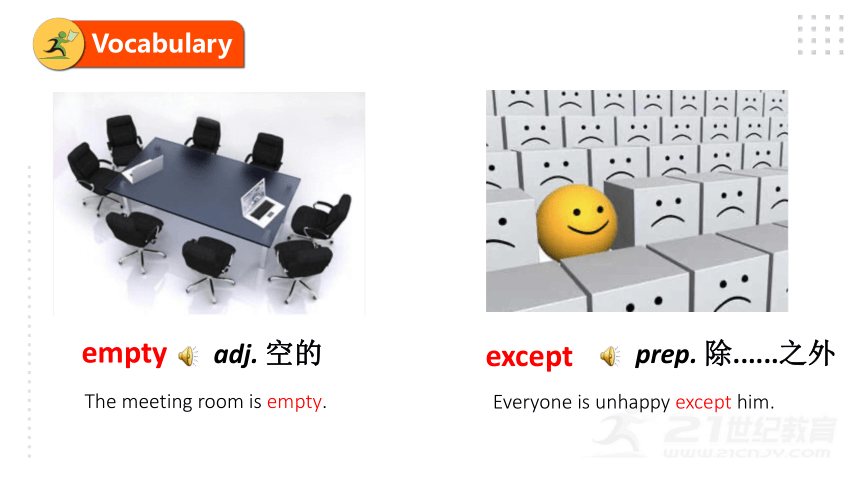
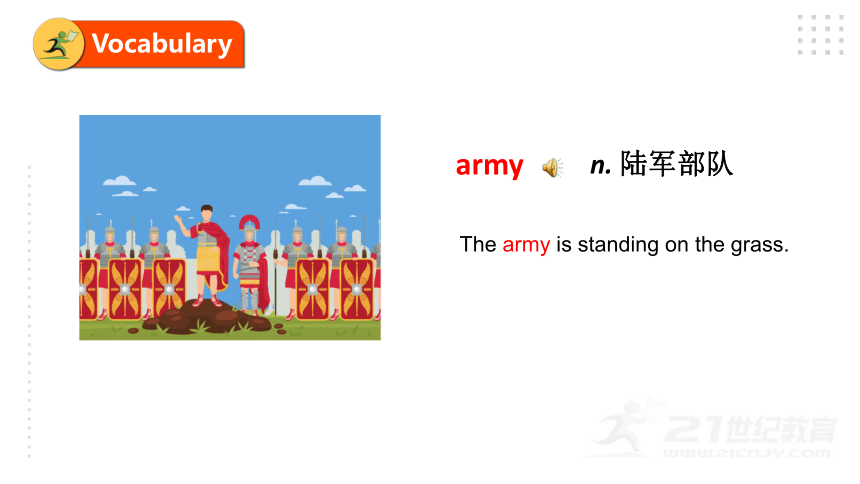

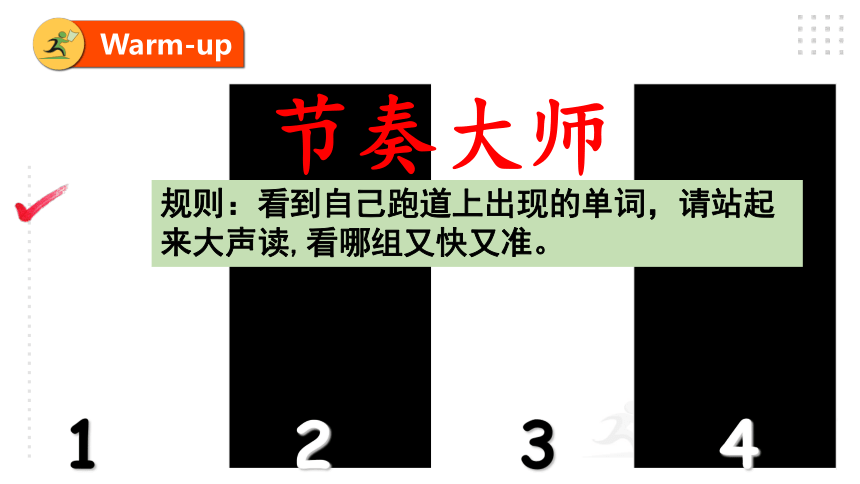
文档简介
(共69张PPT)
Unit 6 Ancient Stories
单元复习精讲精练课件
牛津深圳版(广州·沈阳通用)
七年级上
Content
Vocabulary
01
Language points
02
Grammar
03
04
Writing
Vocabulary
enter
soldier
side
quietly
Vocabulary
Vocabulary
ancient
adj. 古代的
There are lots of ancient buildings in Beijing.
understand
v. 懂;理解
I don’t understand this sentence.
Vocabulary
difference
n. 差别;不同(之处)
There is a big difference between the dog’s two hairstyles.
*capture
v. 用武力夺取;攻占
The boy captured a butterfly with his net.
Vocabulary
main
adj. 主要的
secret
adj. 秘密的
She is telling her friend a surprising secret!
The main stream of this river leads to the sea.
Vocabulary
stupid
adj. 笨的;傻的
midnight
n. 午夜;子夜
The stupid donkey couldn’t work out this easy math problem.
Mom found me playing games at midnight.
Vocabulary
empty
adj. 空的
except
prep. 除......之外
The meeting room is empty.
Everyone is unhappy except him.
Vocabulary
army
n. 陆军部队
The army is standing on the grass.
Vocabulary
trick
n. 计谋
succeed
v. 达到目的;实现目标
I succeeded! Everyone is happy for me!
Children love to play tricks on Halloween.
规则:看到自己跑道上出现的单词,请站起来大声读,看哪组又快又准。
1
2
4
3
节奏大师
Warm-up
1
2
3
4
capture
quietly
Greek
difference
army
difference
enter
soldier
stupid
soldier
succeed
main
secret
pull
celebrate
empty
side
huge
ancient
educational
except
midnight
captain
1. prince n. 王子
王子与那个漂亮的女孩相爱了。
The prince fell in love with the beautiful girl.
王子住在古老的城堡里。
The prince lived in the old castle.
Vocabulary
2. queen n. 王后
【知识拓展】
(1) queen为名词时还可意为“女王”。
(2) 王宫中的称谓小结:
king 国王; queen 王后;
prince 王子; princess 公主
国王和王后端坐在王座上。
The king and his queen were sitting on their thrones.
Vocabulary
3. steal v. 偷;窃取
她的钱让人给偷走了。
Her money has been stolen.
警察逮捕了那个年轻人,因为他偷了年轻人的钱。
The police arrested the young man because he stole money from his neighbour.
Vocabulary
4. punish v. 处罚;惩罚
punishment n. 惩罚;处罚
孩子们因为说谎而受到处罚。
The children were punished for telling lies.
Vocabulary
5. in the end 最后
最后他们决定在美国过夏天。
In the end, they decided to spend the summer in the US.
最后我们一定会成功。
We will succeed in the end.
Vocabulary
6. What happened at the dinner
晚饭时发生了什么?
用于表示时间时,at 通常指确切的某个时刻(不加冠词)或短暂的时间。如:
at six 在六点
at noon 在正午
at that moment 在那时
Vocabulary
1. a____ a mark to indicate a direction or relation
2. i_________ not capable of occurring or being accomplished or dealt with
3. t______ any piece of work that is undertaken or attempted.
4. c_____ a group of people living together in a camp.
5.b____ hit repeatedly
rrow
mpossible
ask
amp
eat
Vocabulary
根据英语释义写出单词。
think of 想到;记起;考虑
fill ... with ... 用……装满……
in the early morning 在清晨
under attack 受到攻击
turn around 转换方向;转身
Phrases
Language
points
【探索】此处give up意为“____________”。
1. Now they’ve given up and sailed away!
现在他们已经认输,并且驾船离开了!
认输;投降
( )Their enemies(敌人) ________ without a fight. So they celebrated happily.
A. got up B. gave up C. looked up D. woke up
B
对点专练
(1) Don’t give up your dream! You should work hard to make it come true.
不要放弃你的梦想!你应该努力工作来实现它。
(2) You must give up smoking. It’s bad for your health.
你必须戒烟,这对你的健康有害。
【观察】此处give up意为“________”,后面可接名词、代词或者动词 ing。
放弃
拓 展
( )①—Jack, the final exam is coming. You must give
up ________ computer games.
—OK, mum.
A. play B. played C. playing D. to play
②数学很难,但是我们不应该放弃学习它。__________________________________________________
C
Maths is difficult, but we should not give up learning it.
对点专练
【探索】make jokes about sth./sb. 意为
“_____________________”。
2. They sang and danced around the horse, and made jokes about the stupid Greeks.
他们围着木马载歌载舞,而且拿愚蠢的希腊人开玩笑。
拿某物/某人开玩笑
( )①—We shouldn’t ________ the George.
—I agree with you. He is a poor boy.
A. take care of B. be unaware of
C. be worried about D. make jokes about
②不要拿别人的缺点开玩笑,这是不礼貌的。
Don’t ________ ________ ________ others’ shortcomings. It’s impolite.
D
make jokes about
对点专练
【探索】except for意为“___________”。
3. By midnight, the main square was empty, except for the huge horse.
午夜之前,除了这匹巨大的木马之外,主广场空荡荡的。
除……之外
除了价格外,这房子是不错的,但是我们没有足够的钱买下它。
The house is very good ________ ________ the price, but we don’t have enough money to buy it.
except for
对点专练
(1) We all went to the zoo except Peter.
除了彼得,我们都去了动物园。(彼得没有去)
(2) We all went to the zoo besides Peter.
除了彼得外,我们也都去了动物园。(包括彼得在内)
拓 展
except for for后面接的宾语与句子的主语不是同一类,表示从整体中除去某一细节或某一方面 相减关系
except 所接的宾语与句子的主语属于同一类,指在同类的整体中除去except后面的部分 相减关系
besides 意为“除……之外(还有……)”,表示包括besides后的内容 相加关系
观 察
( )①All the students passed the final exam,
________ Mike, because he played
computer games day and night.
A. except B. beside
C. besides D. except for
A
能力提升
( )②—John can speak English very well. Can John speak any other language ________ English
—Yes, he can speak Japanese and French.
A. except B. beside
C. besides D. except for
C
( )③—Timmy, your writing is very good
________ some spelling mistakes.
—OK, I will correct my mistakes as soon as possible.
A. except B. beside
C. besides D. except for
D
【探索】be full of 意为“_______________________”。
4. The horse was full of Greek soldiers!
木马里有大量的希腊士兵!
装满/充满……;大量的
( )①—Life ________ surprises, isn’t it
—Yes. No one can tell what will happen
tomorrow.
A. is made by B. is unaware of
C. is interested in D. is full of
②昨天天空中布满了五颜六色的烟花,太美了。
The sky ________ ________ ________ colorful fireworks yesterday. It was so beautiful.
D
was full of
对点专练
【观察】______________=be full of,
意为“装满/充满……”。
The glass is filled with water. 杯子里装满了水。
be filled with
拓 展
Ⅰ. 语法巩固
( )1. My classmates often make jokes ________ my
accent(口音). I feel sad about it.
A. in B. on C. for D. about
( )2. Everyone was here ________ Tom. He hurt his left leg and stayed at home.
A. except B. beside C. besides D. except for
D
A
Practice
( )3. The girl’s basket ________ strawberries. She has picked them for a while.
A. is proud of B. is filled with
C. is interested in D. is good at
( )4. Betty realized she was wrong and ________ the argument(争吵).
A. cheered up B. put up
C. took up D. gave up
B
D
( )5. ________ a man walking his dog, the park was empty.
A. Except B. Beside
C. Besides D. Except for
D
Ⅱ. 完成句子
1. 不管发生什么,我们都不应该放弃希望。
No matter what happens, we should not _____ ______ hope.
2. 大家都很喜欢这场歌唱比赛,除了那糟糕的天气之外。
Everyone enjoyed this singing competition _______ _____ the bad weather.
give up
except for
【探索①】“in+一段时间” 意为“一段时间之后”,句中的时态常用将来时态。
1. I’ll bring you 100, 000 arrows in three days.
三天后我会带给你十万支箭。
Language Point
( )①—Tom, it is getting dark. You should come
back home now.
—OK, mum, I’ll be back ________ ten minutes.
A. in B. for C. before D. at
②我们将会在两天后获得考试成绩。
We will get the test results _____ ______ ______.
A
in two days
对点专练
【观察】对“in+一段时间”提问须用___________,意为“多久以后”。
—How soon will they come back
—他们多久会回来?
—In a week.
—一周后。
How soon
拓 展
【探索】fill…with…,意为“_________________”。
2. Zhuge Liang asked his soldiers to fill 20 large boats with many straw men.
诸葛亮让他的士兵们把二十艘大船装满了许多稻草人。
把……填满……
( )①Would you please ________ my glass ________
some more tea
A. full; of B. full; with
C. fill; of D. fill; with
②上学前,妈妈让我把瓶子装满水。
Before going to school, mother asks me ______ _____ the bottle _____ water.
to fill
with
D
对点专练
ordered
to
fill
with
Practice
are
under
attack
sailed
toward
take
to
Practice
be
under
attack
orders/ordered
to
stop
Practice
Thank
you
for
on
the
other
side
Practice
Grammar
区别 结构 常见连用词
现在完成时 (表示过去发生的动作对现在造成的影响或结果) have / has +过去分词 haven’t / hasn’t + 过去分词 Have / Has + 主语 + 过去分词 this day, these days,now,already,ever, yet, just, before, recently, up to now, in the last few years ...
一般过去时 (表示单纯的过去的事实或状态) 主语+动词过去式+其他 主语+didn‘t+ 动词原形 Did+主语+动词原形 yesterday, last X, just now, then, X ago, in 1994 ...
注意:在用when提问的句子中,一般都使用一般过去时。
Summary
1. I ___________ (work) in the school since
I ______ (move) here in 2006.
2. The Smiths _____ (go) to Shanghai in 2008. They _________ (be) there since then.
3. Shenzhen ____ (be) a small town in the past, but now it __________ (become) a large modern city.
4. I ____ already _______ (write) the article. I _______ (finish) it yesterday.
5. — I ___ (see) the film So Young yesterday.
— Did you I ____________ (not see) it yet.
用所给单词的适当形式填空。
have worked
moved
went
have been
was
has become
have
written
finished
saw
haven’t seen
Practice
1. I have been in Hong Kong for two days. (对划线部分提问)
____ ____ ____ ___ been in Hong Kong
2. The girl began to learn English five years ago. (改为同义句)
The girl ___ _____ English ___ five years.
3. The girl has been a nurse since she left school.
(对划线部分提问)
____ ____ ___ the girl been a nurse
4. I have had this bike since 2002. (改为同义句)
I ______ this bike ___ 2002.
5. The children arrived here at 9 o’clock. (改为同义句)
The children ____ ____ here _____ 9 o’clock.
按要求改写下列句子,每空一词。
How long have you
has learnt
for
How long has
bought in
have been since
Practice
选择题
1. ---Wendy,how long have you had the Huawei P30 pro
---A couple of days. I _______it last week.
A.bought B.buy C.will buy D.have bought
2. ---Have you ______chemistry for coming exam
----Yes. I'm quite ready for it.
A.repeated B.copied C.marked D.reviewed
3. He ______me his name,but I can't remember it now.
A.tells B.will tell C.told D.is telling
Practice
4. ---My feelings for you have not changed.
---But you have changed. You are not as you____.
A.are B.were C.will be D.have been
5.I ____Game of Thrones(《权力的游戏》)with my friends last month.It's amazing.
A.watch B.watched C.watches D.have watched
6. I _____abroad for several years,but I have never regretted my final decision to move back to my motherland.
A.am living B.lived C.have lived
7. --- Where did you go last winter vacation
--- I _____to London with my family.
A.go B.have gone C.went D.was going
8. His car ______ five years ago, but it looks quite new.
A.buys B.bought C.is bought D.was bought
Writing
话题写作思维导图
拓 展
假如你是李华,本周的英语角活动要求同学们分享一个历史人物的故事,你很喜欢历史人物冯子材,请你写一篇英语短文,分享冯子才的故事,需包括以下要点。
对点专练
注意:
1. 词数:80词左右(短文的开头已给出,不计入词数);
2. 不得透露学校、姓名等任何个人信息,否则不予评分。
第一步:审题 人称:__________________
时态:__________________
第二步:列提纲
第一段
第二段
第三段
简述冯子材的家庭背景。He was born in…;He liked…when he was very young; He learned a lot from…
详细介绍冯子材的部队生活。As a soldier, he was…; He became…; He asked…
表达个人观点。We can learn that…; We should…
第一人称、第三人称
一般过去时
写作指导
第三步:遣词造句
1. decide to do sth. 意为“决定做某事”。
【例句】一天,特洛伊的王子,帕里斯决定做什么?
What did Pairs, the prince of Troy, decide to do one day
【仿写】多年后,冯子材决定参军,成为一位士兵。
______________________________________________________________________________________________________
Years later, Feng Zicai decided to join the army and became a soldier.
2. be good at doing sth.意为“擅长做某事”。
【例句】我擅长游泳和打篮球。
I am good at swimming and playing basketball.
【仿写】作为一名士兵,冯子材英勇善战。______________________________________________________________________________________________________
第四步:运用when, later, and, as, so, but等连接词连接句子,并注意句型多样化。
As a soldier, Feng Zicai was brave and was good at fighting.
Feng Zicai a national hero in China.______________
_________________________________________________
_________________________________________________
_________________________________________________
_________________________________________________
___________________________________________________________________________________________________________________________________________________
He was born in a poor family. His parents died when he was still little. In his childhood, other children liked to play outside, except Feng Zicai. He liked reading very much and he learned a lot from different kinds of books.
Years later, Feng Zicai decided to join the army and became a soldier. As a soldier, Feng Zicai was
范 文
________________________________________________________________________________________________________________________________________________________________________________________________________________________________________________________________________________________________________________________________________________________________________________
brave and was good at fighting. He was very excellent in the army, so he became a captain of the army. Feng Zicai asked the soldiers to fight with enemies and led them to win many wars.
Feng Zicai was a great hero. In his story, we can learn that we shouldn’t give up easily when we face difficulties. We should believe that where there is a will, there is a way.
谢谢
21世纪教育网(www.21cnjy.com)
中小学教育资源网站
兼职招聘:
https://www.21cnjy.com/recruitment/home/admin
Unit 6 Ancient Stories
单元复习精讲精练课件
牛津深圳版(广州·沈阳通用)
七年级上
Content
Vocabulary
01
Language points
02
Grammar
03
04
Writing
Vocabulary
enter
soldier
side
quietly
Vocabulary
Vocabulary
ancient
adj. 古代的
There are lots of ancient buildings in Beijing.
understand
v. 懂;理解
I don’t understand this sentence.
Vocabulary
difference
n. 差别;不同(之处)
There is a big difference between the dog’s two hairstyles.
*capture
v. 用武力夺取;攻占
The boy captured a butterfly with his net.
Vocabulary
main
adj. 主要的
secret
adj. 秘密的
She is telling her friend a surprising secret!
The main stream of this river leads to the sea.
Vocabulary
stupid
adj. 笨的;傻的
midnight
n. 午夜;子夜
The stupid donkey couldn’t work out this easy math problem.
Mom found me playing games at midnight.
Vocabulary
empty
adj. 空的
except
prep. 除......之外
The meeting room is empty.
Everyone is unhappy except him.
Vocabulary
army
n. 陆军部队
The army is standing on the grass.
Vocabulary
trick
n. 计谋
succeed
v. 达到目的;实现目标
I succeeded! Everyone is happy for me!
Children love to play tricks on Halloween.
规则:看到自己跑道上出现的单词,请站起来大声读,看哪组又快又准。
1
2
4
3
节奏大师
Warm-up
1
2
3
4
capture
quietly
Greek
difference
army
difference
enter
soldier
stupid
soldier
succeed
main
secret
pull
celebrate
empty
side
huge
ancient
educational
except
midnight
captain
1. prince n. 王子
王子与那个漂亮的女孩相爱了。
The prince fell in love with the beautiful girl.
王子住在古老的城堡里。
The prince lived in the old castle.
Vocabulary
2. queen n. 王后
【知识拓展】
(1) queen为名词时还可意为“女王”。
(2) 王宫中的称谓小结:
king 国王; queen 王后;
prince 王子; princess 公主
国王和王后端坐在王座上。
The king and his queen were sitting on their thrones.
Vocabulary
3. steal v. 偷;窃取
她的钱让人给偷走了。
Her money has been stolen.
警察逮捕了那个年轻人,因为他偷了年轻人的钱。
The police arrested the young man because he stole money from his neighbour.
Vocabulary
4. punish v. 处罚;惩罚
punishment n. 惩罚;处罚
孩子们因为说谎而受到处罚。
The children were punished for telling lies.
Vocabulary
5. in the end 最后
最后他们决定在美国过夏天。
In the end, they decided to spend the summer in the US.
最后我们一定会成功。
We will succeed in the end.
Vocabulary
6. What happened at the dinner
晚饭时发生了什么?
用于表示时间时,at 通常指确切的某个时刻(不加冠词)或短暂的时间。如:
at six 在六点
at noon 在正午
at that moment 在那时
Vocabulary
1. a____ a mark to indicate a direction or relation
2. i_________ not capable of occurring or being accomplished or dealt with
3. t______ any piece of work that is undertaken or attempted.
4. c_____ a group of people living together in a camp.
5.b____ hit repeatedly
rrow
mpossible
ask
amp
eat
Vocabulary
根据英语释义写出单词。
think of 想到;记起;考虑
fill ... with ... 用……装满……
in the early morning 在清晨
under attack 受到攻击
turn around 转换方向;转身
Phrases
Language
points
【探索】此处give up意为“____________”。
1. Now they’ve given up and sailed away!
现在他们已经认输,并且驾船离开了!
认输;投降
( )Their enemies(敌人) ________ without a fight. So they celebrated happily.
A. got up B. gave up C. looked up D. woke up
B
对点专练
(1) Don’t give up your dream! You should work hard to make it come true.
不要放弃你的梦想!你应该努力工作来实现它。
(2) You must give up smoking. It’s bad for your health.
你必须戒烟,这对你的健康有害。
【观察】此处give up意为“________”,后面可接名词、代词或者动词 ing。
放弃
拓 展
( )①—Jack, the final exam is coming. You must give
up ________ computer games.
—OK, mum.
A. play B. played C. playing D. to play
②数学很难,但是我们不应该放弃学习它。__________________________________________________
C
Maths is difficult, but we should not give up learning it.
对点专练
【探索】make jokes about sth./sb. 意为
“_____________________”。
2. They sang and danced around the horse, and made jokes about the stupid Greeks.
他们围着木马载歌载舞,而且拿愚蠢的希腊人开玩笑。
拿某物/某人开玩笑
( )①—We shouldn’t ________ the George.
—I agree with you. He is a poor boy.
A. take care of B. be unaware of
C. be worried about D. make jokes about
②不要拿别人的缺点开玩笑,这是不礼貌的。
Don’t ________ ________ ________ others’ shortcomings. It’s impolite.
D
make jokes about
对点专练
【探索】except for意为“___________”。
3. By midnight, the main square was empty, except for the huge horse.
午夜之前,除了这匹巨大的木马之外,主广场空荡荡的。
除……之外
除了价格外,这房子是不错的,但是我们没有足够的钱买下它。
The house is very good ________ ________ the price, but we don’t have enough money to buy it.
except for
对点专练
(1) We all went to the zoo except Peter.
除了彼得,我们都去了动物园。(彼得没有去)
(2) We all went to the zoo besides Peter.
除了彼得外,我们也都去了动物园。(包括彼得在内)
拓 展
except for for后面接的宾语与句子的主语不是同一类,表示从整体中除去某一细节或某一方面 相减关系
except 所接的宾语与句子的主语属于同一类,指在同类的整体中除去except后面的部分 相减关系
besides 意为“除……之外(还有……)”,表示包括besides后的内容 相加关系
观 察
( )①All the students passed the final exam,
________ Mike, because he played
computer games day and night.
A. except B. beside
C. besides D. except for
A
能力提升
( )②—John can speak English very well. Can John speak any other language ________ English
—Yes, he can speak Japanese and French.
A. except B. beside
C. besides D. except for
C
( )③—Timmy, your writing is very good
________ some spelling mistakes.
—OK, I will correct my mistakes as soon as possible.
A. except B. beside
C. besides D. except for
D
【探索】be full of 意为“_______________________”。
4. The horse was full of Greek soldiers!
木马里有大量的希腊士兵!
装满/充满……;大量的
( )①—Life ________ surprises, isn’t it
—Yes. No one can tell what will happen
tomorrow.
A. is made by B. is unaware of
C. is interested in D. is full of
②昨天天空中布满了五颜六色的烟花,太美了。
The sky ________ ________ ________ colorful fireworks yesterday. It was so beautiful.
D
was full of
对点专练
【观察】______________=be full of,
意为“装满/充满……”。
The glass is filled with water. 杯子里装满了水。
be filled with
拓 展
Ⅰ. 语法巩固
( )1. My classmates often make jokes ________ my
accent(口音). I feel sad about it.
A. in B. on C. for D. about
( )2. Everyone was here ________ Tom. He hurt his left leg and stayed at home.
A. except B. beside C. besides D. except for
D
A
Practice
( )3. The girl’s basket ________ strawberries. She has picked them for a while.
A. is proud of B. is filled with
C. is interested in D. is good at
( )4. Betty realized she was wrong and ________ the argument(争吵).
A. cheered up B. put up
C. took up D. gave up
B
D
( )5. ________ a man walking his dog, the park was empty.
A. Except B. Beside
C. Besides D. Except for
D
Ⅱ. 完成句子
1. 不管发生什么,我们都不应该放弃希望。
No matter what happens, we should not _____ ______ hope.
2. 大家都很喜欢这场歌唱比赛,除了那糟糕的天气之外。
Everyone enjoyed this singing competition _______ _____ the bad weather.
give up
except for
【探索①】“in+一段时间” 意为“一段时间之后”,句中的时态常用将来时态。
1. I’ll bring you 100, 000 arrows in three days.
三天后我会带给你十万支箭。
Language Point
( )①—Tom, it is getting dark. You should come
back home now.
—OK, mum, I’ll be back ________ ten minutes.
A. in B. for C. before D. at
②我们将会在两天后获得考试成绩。
We will get the test results _____ ______ ______.
A
in two days
对点专练
【观察】对“in+一段时间”提问须用___________,意为“多久以后”。
—How soon will they come back
—他们多久会回来?
—In a week.
—一周后。
How soon
拓 展
【探索】fill…with…,意为“_________________”。
2. Zhuge Liang asked his soldiers to fill 20 large boats with many straw men.
诸葛亮让他的士兵们把二十艘大船装满了许多稻草人。
把……填满……
( )①Would you please ________ my glass ________
some more tea
A. full; of B. full; with
C. fill; of D. fill; with
②上学前,妈妈让我把瓶子装满水。
Before going to school, mother asks me ______ _____ the bottle _____ water.
to fill
with
D
对点专练
ordered
to
fill
with
Practice
are
under
attack
sailed
toward
take
to
Practice
be
under
attack
orders/ordered
to
stop
Practice
Thank
you
for
on
the
other
side
Practice
Grammar
区别 结构 常见连用词
现在完成时 (表示过去发生的动作对现在造成的影响或结果) have / has +过去分词 haven’t / hasn’t + 过去分词 Have / Has + 主语 + 过去分词 this day, these days,now,already,ever, yet, just, before, recently, up to now, in the last few years ...
一般过去时 (表示单纯的过去的事实或状态) 主语+动词过去式+其他 主语+didn‘t+ 动词原形 Did+主语+动词原形 yesterday, last X, just now, then, X ago, in 1994 ...
注意:在用when提问的句子中,一般都使用一般过去时。
Summary
1. I ___________ (work) in the school since
I ______ (move) here in 2006.
2. The Smiths _____ (go) to Shanghai in 2008. They _________ (be) there since then.
3. Shenzhen ____ (be) a small town in the past, but now it __________ (become) a large modern city.
4. I ____ already _______ (write) the article. I _______ (finish) it yesterday.
5. — I ___ (see) the film So Young yesterday.
— Did you I ____________ (not see) it yet.
用所给单词的适当形式填空。
have worked
moved
went
have been
was
has become
have
written
finished
saw
haven’t seen
Practice
1. I have been in Hong Kong for two days. (对划线部分提问)
____ ____ ____ ___ been in Hong Kong
2. The girl began to learn English five years ago. (改为同义句)
The girl ___ _____ English ___ five years.
3. The girl has been a nurse since she left school.
(对划线部分提问)
____ ____ ___ the girl been a nurse
4. I have had this bike since 2002. (改为同义句)
I ______ this bike ___ 2002.
5. The children arrived here at 9 o’clock. (改为同义句)
The children ____ ____ here _____ 9 o’clock.
按要求改写下列句子,每空一词。
How long have you
has learnt
for
How long has
bought in
have been since
Practice
选择题
1. ---Wendy,how long have you had the Huawei P30 pro
---A couple of days. I _______it last week.
A.bought B.buy C.will buy D.have bought
2. ---Have you ______chemistry for coming exam
----Yes. I'm quite ready for it.
A.repeated B.copied C.marked D.reviewed
3. He ______me his name,but I can't remember it now.
A.tells B.will tell C.told D.is telling
Practice
4. ---My feelings for you have not changed.
---But you have changed. You are not as you____.
A.are B.were C.will be D.have been
5.I ____Game of Thrones(《权力的游戏》)with my friends last month.It's amazing.
A.watch B.watched C.watches D.have watched
6. I _____abroad for several years,but I have never regretted my final decision to move back to my motherland.
A.am living B.lived C.have lived
7. --- Where did you go last winter vacation
--- I _____to London with my family.
A.go B.have gone C.went D.was going
8. His car ______ five years ago, but it looks quite new.
A.buys B.bought C.is bought D.was bought
Writing
话题写作思维导图
拓 展
假如你是李华,本周的英语角活动要求同学们分享一个历史人物的故事,你很喜欢历史人物冯子材,请你写一篇英语短文,分享冯子才的故事,需包括以下要点。
对点专练
注意:
1. 词数:80词左右(短文的开头已给出,不计入词数);
2. 不得透露学校、姓名等任何个人信息,否则不予评分。
第一步:审题 人称:__________________
时态:__________________
第二步:列提纲
第一段
第二段
第三段
简述冯子材的家庭背景。He was born in…;He liked…when he was very young; He learned a lot from…
详细介绍冯子材的部队生活。As a soldier, he was…; He became…; He asked…
表达个人观点。We can learn that…; We should…
第一人称、第三人称
一般过去时
写作指导
第三步:遣词造句
1. decide to do sth. 意为“决定做某事”。
【例句】一天,特洛伊的王子,帕里斯决定做什么?
What did Pairs, the prince of Troy, decide to do one day
【仿写】多年后,冯子材决定参军,成为一位士兵。
______________________________________________________________________________________________________
Years later, Feng Zicai decided to join the army and became a soldier.
2. be good at doing sth.意为“擅长做某事”。
【例句】我擅长游泳和打篮球。
I am good at swimming and playing basketball.
【仿写】作为一名士兵,冯子材英勇善战。______________________________________________________________________________________________________
第四步:运用when, later, and, as, so, but等连接词连接句子,并注意句型多样化。
As a soldier, Feng Zicai was brave and was good at fighting.
Feng Zicai a national hero in China.______________
_________________________________________________
_________________________________________________
_________________________________________________
_________________________________________________
___________________________________________________________________________________________________________________________________________________
He was born in a poor family. His parents died when he was still little. In his childhood, other children liked to play outside, except Feng Zicai. He liked reading very much and he learned a lot from different kinds of books.
Years later, Feng Zicai decided to join the army and became a soldier. As a soldier, Feng Zicai was
范 文
________________________________________________________________________________________________________________________________________________________________________________________________________________________________________________________________________________________________________________________________________________________________________________
brave and was good at fighting. He was very excellent in the army, so he became a captain of the army. Feng Zicai asked the soldiers to fight with enemies and led them to win many wars.
Feng Zicai was a great hero. In his story, we can learn that we shouldn’t give up easily when we face difficulties. We should believe that where there is a will, there is a way.
谢谢
21世纪教育网(www.21cnjy.com)
中小学教育资源网站
兼职招聘:
https://www.21cnjy.com/recruitment/home/admin
